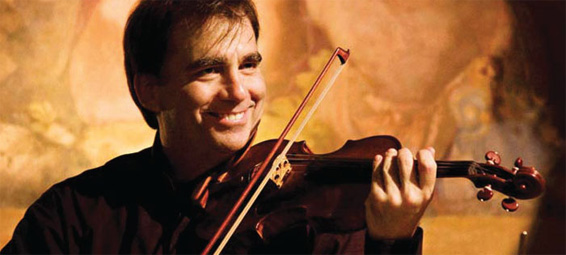Philip Glass’ rambling, 40-minute Violin Concerto No. 2 (The American Four Seasons) of 2009 provided the centerpiece for Thursday night’s concert of the Dallas Symphony at Morton H. Meyerson Symphony Center. Soloist Robert McDuffie won the audience over for the work with a passionate, virtuosic reading in which there is little physical or emotional rest for the soloist.
Still, for this listener at least, the performance posed many questions concerning the ultimate quality and durability of the piece. Glass’ essential minimalism, in which almost bland harmonies and static melodies are repeated constantly, is obviously present, though not to the overwhelming degree in his earlier works. That style, tied to a deliberately serene time-scale, often works beautifully to pull the listener into a state of quasi-hypnotic serenity. For this listener, in this performance, the repetition rather than the serenity predominated, and felt constantly aware of hearing the same material over and over.
The structure of the work, while innovative, with brief “Songs” for Violin alone alternating with sections for the soloist with full orchestra of strings and synthesizer, was, ultimately, four-square and predictable, and not in a good way. One could all too easily know almost exactly what was coming next.
And the scoring, while often beautiful (particularly in Movement II), was heavy on the synthesizer—and, given Glass’ decades-long and often skillful familiarity with that device, disturbingly unimaginative. It seemed that Glass, drawing on the obvious reference of the work to Vivaldi’s concerto cycle The Four Seasons, may have wanted to use the synthesizer as a sort of electronic harpsichord. Unfortunately, he seemed to have heard too many of those bad baroque performances in which an under-trained harpsichordist plows through a turgid “realization” of his part. Whether or not this is the case, the scoring of the work merits re-examination by Glass, with consideration of possibilities including entirely omitting the synthesizer part and retaining the often striking timbres of the string orchestra, as well as adding other acoustic instruments.
(This listener could hardly help mentally comparing the mixed bag of this Vivaldi-inspired work with another contemporary American response to Vivaldi’s cycle, Mark O’Connor’s American Seasons violin concerto, of 1999 with its unfailing lyricism and brilliant, constantly engaging structure.)
On the rest of the program, guest conductor Peter Oundjian succumbed to a tendency toward bombast throughout the evening, beginning by drowning the energy and lyricism of the opening work, Glinka’s Overture to Ruslan and Lyudmila, in overblown volumes and too-fast tempos. After the Glass and intermission, Oundjian returned to apply the same brutal approach to Tchaikovsky’s “Little Russian” Symphony, with the lyrical second movement as a pleasant respite. In spite of a polite but not particularly overwhelming audience response, he joined the orchestra to present the Polonaise from Tchaikovsky’s Euguene Onegin as an encore, with yet more questionable over-enthusiasm.
Photo: Violinist Robert McDuffie





